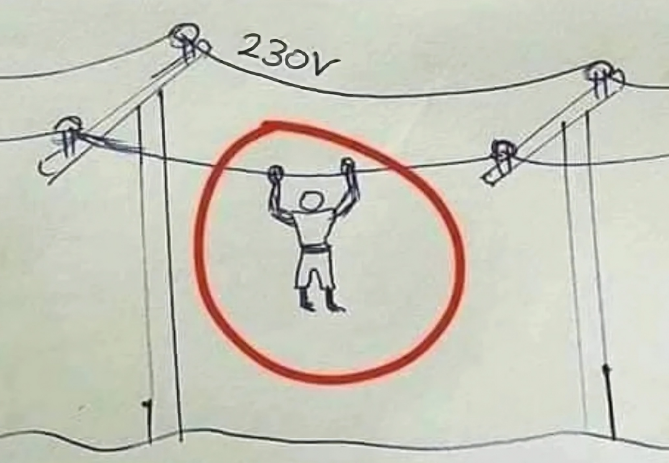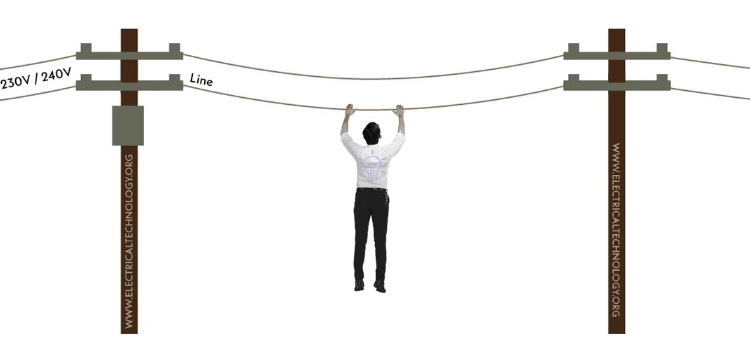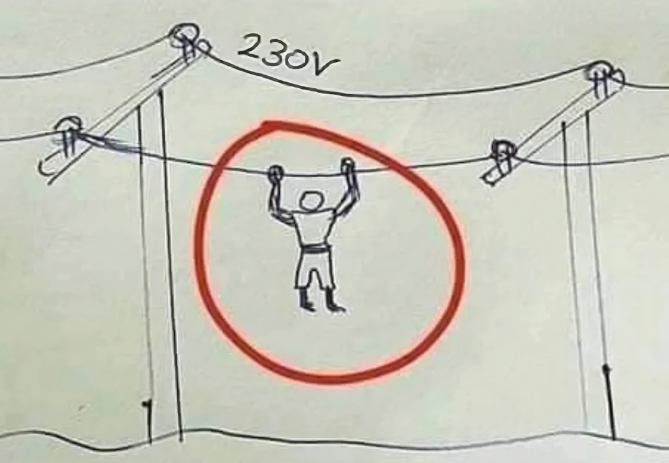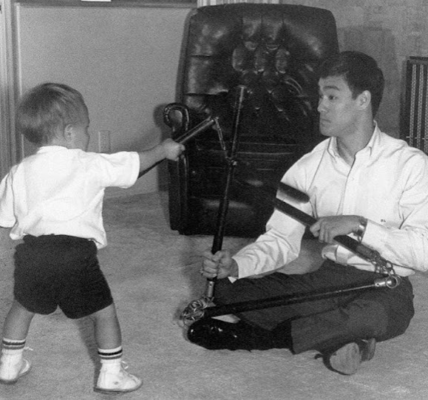Have you ever wondered what would happen if someone grabbed a live electrical wire? Would they get shocked immediately, or could there be a way to avoid it? While this may sound like a scenario straight out of an action movie, the reality is grounded in science. Understanding how electricity works can answer this question and shed light on why birds can safely perch on power lines while humans face severe risks. In this article, we’ll dive into the science of electrical shock, why some creatures are safe on power lines, and the real dangers of attempting to grab a live wire yourself.
The Science Behind Electrical Shock: Understanding Electricity

To answer the question of whether grabbing a live wire will shock you, we need to understand how electricity works. Electricity flows through a complete circuit—a path that moves from the power source, through a conductor, and back to the source. For electricity to flow, there must be a complete circuit. The human body, being conductive, can easily complete this circuit if it comes into contact with a power source and another conductor, like the ground or a different wire.
Why Touching a Live Wire Could Shock You
When you grab a live wire, whether you get shocked depends entirely on whether or not your body creates a complete circuit. If you touch only the live wire without touching anything else, there may not be an immediate shock. However, as soon as you touch another conductive material—like the ground, another wire, or a metal object—you complete the circuit, and electricity can flow through your body. That’s when the shock happens.
Why Birds Aren’t Shocked on Power Lines: The Simple Answer
Ever notice birds calmly sitting on power lines without a care in the world? It’s a common question: Why don’t birds get shocked? The answer lies in the fact that they’re not completing an electrical circuit. Birds sit on a single wire and don’t touch anything else. As a result, electricity continues to flow through the wire without using the bird as a conductor. Since the bird isn’t providing a path for electricity to travel, no current passes through them.
Understanding Why Birds Are Safe on Power Lines
A bird sitting on a single wire doesn’t get shocked because it is not completing a circuit. For humans, the situation is different. If a human were to touch the same wire without touching anything else, they might avoid a shock. However, this doesn’t mean it’s safe to try it, and there are critical reasons why it’s still a dangerous idea.
What Makes Hanging from a Live Wire Dangerous?
While birds are safe on power lines, humans are not. Grabbing a live wire or hanging from one can be deadly. Here’s why:
Creating a Complete Circuit
The primary danger arises when a person completes an electrical circuit. If someone hanging on a live wire touches another wire, a metal structure, or the ground, they complete the circuit. At that point, electricity can flow through their body, resulting in a potentially fatal shock.
High Voltage and Arcing Risks
Power lines carry high voltage—often thousands of volts. Even if someone isn’t directly touching another conductor, the high voltage could cause an electric arc. This arc could jump through the air and reach the person, delivering a shock even without direct contact.
Unpredictable Movements and Electrical Burns
Another risk comes from the person’s movement. As they hang, their weight or unintentional swing could cause them to come into contact with another wire or metal object, creating a circuit and resulting in a shock. Additionally, the high voltage can create electrical burns or cause muscle spasms, making it harder for the person to react and move away from the wire.
What Would Happen If You Touched Both a Live Wire and the Ground?

Now, let’s consider the worst-case scenario. If you’re hanging from a live wire and touch another conductor—like the ground or a different wire—you’ve created a complete circuit. As soon as the circuit is completed, electricity will flow through your body. This can be disastrous, leading to:
- Cardiac arrest: The shock can disrupt your heart’s rhythm, potentially leading to fatal consequences.
- Severe burns: Electricity passing through the body can cause significant burns at the point of contact.
- Muscle spasms: Electrical shocks can cause muscles to seize, which might make it impossible for the person to let go of the wire or escape the current.
How Electricians Safely Work on Power Lines
Professionals who work on power lines are highly trained to minimize the risks associated with high-voltage electricity. They use specialized equipment to protect themselves from electric shocks.
Insulated Gloves and Boots
Electricians wear insulated gloves and boots to prevent electricity from traveling through their bodies if they come into contact with live wires. These protective garments are designed to block the flow of current and keep them safe.
Specialized Tools Made from Non-Conductive Materials
Electricians also use tools made from non-conductive materials, such as rubber, to avoid completing a circuit when working on live wires. These tools prevent electricity from traveling through the body in case of accidental contact with a live wire.
Grounding and Safety Protocols
Grounding is another critical safety measure. Electricians often ground power lines or use grounding equipment to ensure that any stray current is safely directed away from their bodies. They also follow strict protocols and receive extensive training to understand the behavior of high-voltage electricity and how to avoid completing a circuit.
Can You Hang from a Live Wire and Avoid Getting Shocked?

Technically, it might be possible to grab a live wire without getting shocked if you don’t touch anything else. But this scenario is extremely rare and depends on several factors, including the distance between the wire and any other conductors or grounded objects. Even if you are not directly touching anything else, there are still significant risks involved.
The Risk of High-Voltage Arcing
Power lines are often under high voltage, and electricity can “jump” from one conductor to another, especially in the presence of a conductive material like the human body. This is called arcing, and it can cause a shock even if you’re not in direct contact with the second wire or the ground.
Risk of Unintended Contact
Hanging from a wire and maintaining no contact with other surfaces is difficult. Movement, wind, or even the weight of your body could cause you to touch another wire or a grounded object, completing the circuit and leading to a dangerous shock.
The Final Verdict: Never Try This
In conclusion, while the theory might suggest that you could grab a live wire without getting shocked, the risks are simply too high to attempt it. Power lines carry dangerous amounts of voltage, and the unpredictability of electricity makes it too risky to even consider. The safest option is to stay far away from live wires, whether you’re working near them or just curious about them.
Respect the Power of Electricity
Electricity is a powerful force that must be treated with the utmost respect. Although the curiosity behind these questions is natural, it’s important to understand the science behind electricity and recognize the severe dangers involved. Birds can safely perch on power lines because they don’t complete a circuit, but humans are not so lucky. Always prioritize safety, stay away from live wires, and leave any electrical work to professionals who are trained to handle it. Remember, electricity is not forgiving, and a small mistake can have catastrophic consequences. Stay safe!


